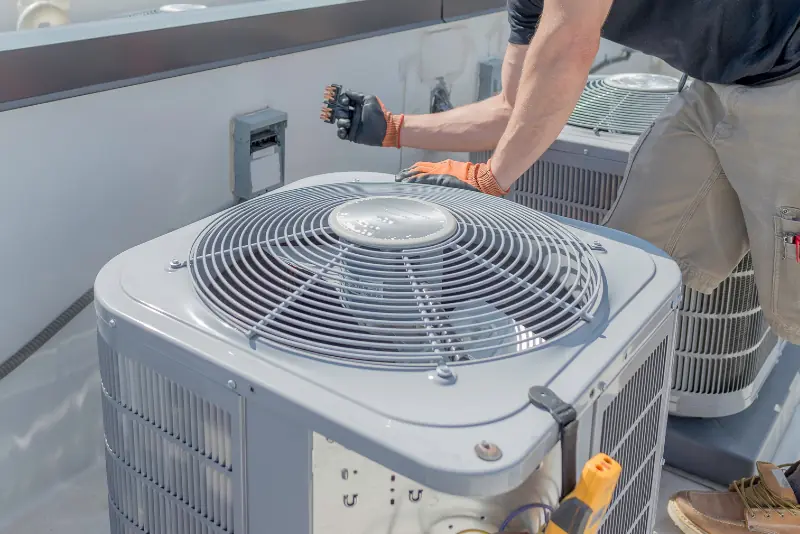In this guide, we’ll break down what you need to know about HVAC systems, how they work, and why they’re important for your home’s comfort and efficiency.

Intro
Whether you’ve just moved into your first home or you’re planning to upgrade your existing heating and cooling system, understanding the basics of HVAC (Heating, Ventilation, and Air Conditioning) is essential. The good news? It’s not as complicated as it sounds!
What is HVAC?
HVAC stands for Heating, Ventilation, and Air Conditioning. It’s the system responsible for keeping your home warm in the winter, cool in the summer, and ensuring that the air you breathe is fresh and clean all year round. Essentially, it’s the backbone of your home’s comfort.
The Main Components of an HVAC System
An HVAC system is made up of several key components, each playing a crucial role in maintaining your home’s climate:
• Furnace: This is the part of your HVAC system that provides heat. Most furnaces use natural gas, propane, or electricity to generate warmth. The furnace’s blower then distributes the heated air through your home’s ductwork.
• Air Conditioner: Your AC unit is what keeps your home cool during hot summer months. It removes heat from the air inside your home and releases it outside. The cooled air is then circulated back into your living spaces.
• Ductwork: These are the passages that deliver air from your HVAC system to different rooms in your home. Properly sealed and insulated ductwork is essential for efficient operation and consistent temperature control.
• Thermostat: The thermostat is your control center. It lets you set your desired temperature and can even be programmed to adjust settings automatically, saving energy and keeping your home comfortable.
• Ventilation: Ventilation is the process of exchanging stale indoor air with fresh outdoor air. This can happen naturally through windows and doors or mechanically through exhaust fans and ventilation systems.
• Filters: HVAC filters are essential for keeping the air in your home clean. They trap dust, pollen, and other particles, preventing them from circulating through your living spaces.
Why Is HVAC Important?
Your HVAC system does more than just keep you comfortable; it also plays a vital role in your home’s overall health and energy efficiency. Here’s how:
• Comfort: A well-functioning HVAC system ensures that your home stays at a consistent, comfortable temperature, regardless of the weather outside.
• Air Quality: HVAC systems help to filter and purify the air, reducing allergens, dust, and other pollutants that can affect your health.
• Energy Efficiency: Modern HVAC systems are designed to be energy-efficient, which can save you money on your utility bills and reduce your carbon footprint.
• Home Value: A high-quality, well-maintained HVAC system can increase the value of your home, making it a smart investment for the future.
Choosing the Right HVAC System for Your Home
When it’s time to choose or upgrade your HVAC system, there are a few factors to consider:
Size: The size of your HVAC system should match the size of your home. A system that’s too small won’t effectively heat or cool your space, while a system that’s too large will cycle on and off frequently, wasting energy.
Efficiency: Look for systems with high SEER (Seasonal Energy Efficiency Ratio) ratings for cooling and high AFUE (Annual Fuel Utilization Efficiency) ratings for heating. These ratings indicate how efficiently the system operates.
Type: Depending on your climate and personal preferences, you may choose between traditional split systems, ductless mini-splits, heat pumps, or even geothermal systems.
Maintenance: Regular maintenance is key to keeping your HVAC system running smoothly. Annual inspections, filter changes, and cleaning can prevent costly repairs and extend the life of your system.
Work with an Expert HVAC company
Using an expert HVAC company for installation or upgrades ensures that your system is set up correctly and operates at peak efficiency. Professional technicians bring specialized knowledge and experience, allowing them to accurately assess your specific needs, recommend the most suitable equipment, and ensure precise installation. This not only maximizes energy efficiency and comfort but also reduces the likelihood of costly repairs and premature system failure. Moreover, expert HVAC companies are familiar with the latest technologies and industry standards, ensuring that your system meets all regulatory requirements and delivers optimal performance for years to come.
